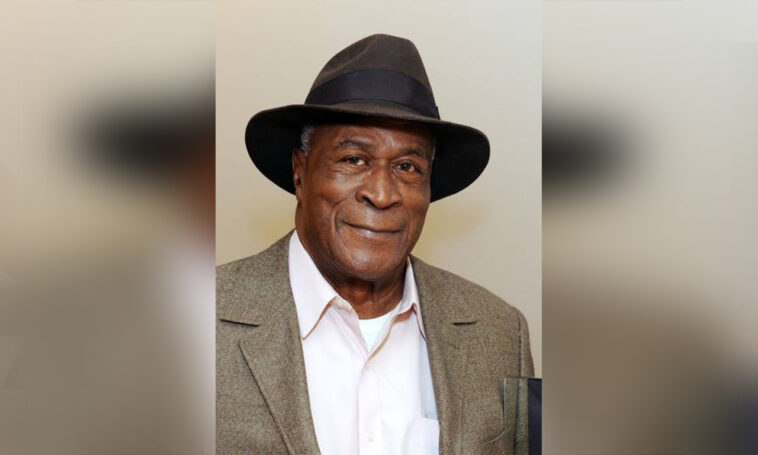John Amos, an iconic figure in American television history, passed away at the age of 84 in Los Angeles. Best known for his role as a tough but loving father in the groundbreaking sitcom Good Times and as a central character in Roots, the television miniseries that captivated the nation, Amos left behind a lasting legacy. His publicist, Belinda Foster, confirmed his death, stating that he had passed on August 21st, though the cause of his death and reasons for the delayed announcement were not disclosed.
Amos’s acting career spanned over five decades, earning him critical acclaim and a place in American entertainment history. His big break came in 1970 with a recurring role on The Mary Tyler Moore Show, where he played Gordy, the charming weatherman working alongside Mary Richards, played by the legendary Mary Tyler Moore. This exposure led to other opportunities, and after three seasons, Amos moved on to what would become one of his defining roles: James Evans Sr. on Good Times.
Good Times, a spin-off of Norman Lear’s Maude, aired from 1974 to 1979 on CBS and depicted the struggles of a Black working-class family living in the Chicago projects. Amos portrayed the strict but loving patriarch, James Evans Sr., a father determined to provide for his family despite numerous hardships. Alongside Esther Rolle, who played his wife, Florida Evans, and their children, Michael, J.J., and Thelma, Amos brought a sense of authenticity and depth to the portrayal of life in public housing. The show tackled important issues such as racial discrimination, drug abuse, and poverty, all while maintaining a comedic element that resonated with audiences.
One memorable moment in the series is when James, reflecting on his impoverished upbringing, quips, “I had patches on my patches,” a line that encapsulated the humor and hardship woven throughout the show.
Good Times not only garnered high ratings but also made television history as one of the first sitcoms to feature an all-Black cast. However, both Amos and his co-star, Esther Rolle, pushed for even greater inclusion of Black voices behind the scenes. They felt the scripts, which were primarily written by white writers, didn’t always accurately reflect the Black experience. Amos was known for challenging the creative direction of the show, arguing for more authenticity in the storylines. His candidness about the need for change eventually led to friction with the production team. In a candid interview with Sway in the Morning, Amos recounted how his disagreements with the writers led to his dismissal from the show in 1976. His character was written out, with James Evans Sr. killed off in a car accident during the fourth season. Reflecting on his departure, Amos stated, “I had a way of voicing my differences with the script that weren’t acceptable to the creative staff.”
Amos’s next major role came in the groundbreaking 1977 mini-series Roots, based on Alex Haley’s semi-autobiographical novel. The mini-series traces the harrowing journey of Kunta Kinte, a Mandinka teenager from The Gambia who is captured and sold into slavery. The show follows Kinte’s descendants through major periods of American history, from the colonial era to the Civil War and beyond. Amos portrayed the older version of Kunta Kinte, while LeVar Burton played the younger version. Roots was not only a cultural phenomenon, drawing a record 100 million viewers for its finale, but it also garnered critical acclaim with 37 Primetime Emmy nominations, winning nine. Amos himself received an Emmy nomination for Outstanding Lead Actor, cementing his place as a powerhouse in the entertainment industry. The show’s impact on American society was profound, sparking a renewed interest in genealogy and African American history.
In the latter part of his life, Amos remained active in the entertainment industry. In the early 2020s, he began working on a docuseries with his son, K.C. Amos, reflecting on their relationship and his long career. The project, titled America’s Dad, showcased the profound influence Amos had on generations of viewers. “So many young men have come up to me and said, ‘Your father was my father,’” K.C
John Amos’s contributions to television, particularly his roles in Good Times and Roots, continue to resonate with audiences. His advocacy for authentic Black representation in media, his compelling performances, and his dedication to his craft have left an indelible mark on American culture.






Join the Community and Be a Part of the Conversation
You must be logged in or registered to post a comment.